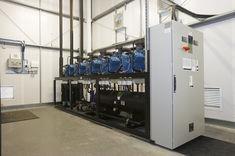
New regulations regarding the containment and recovery of F gases for growers and others operating refrigeration equipment, have come into effect this week.
As the problem of climate change and the impact of greenhouse gases continues to dictate government policy, the new regulations have been brought into effect.
Rising global temperatures will bring changes in weather patterns, rising sea levels and increased frequency and intensity of extreme weather events. The effects will be felt here in the UK, with some citing recent heavy rainfall as evidence, and internationally there may be severe problems for people in regions that are particularly vulnerable to change.
Even if it were able to stop the emission of gases today, the gases released already will have an effect, according to experts.
Kyoto and its protocol may seem a long way away from fresh produce growers and packers but the application of EC regulation no. 842/2006 has been introduced as a direct response to the challenges.
The regulation covers the containment and recovery of F gases, used by anyone who has refrigeration equipment for storage systems. Operators of this equipment have a range of obligations including prompt leakage repair, leakage checking and record keeping and ensuring that appropriately qualified personnel are used.
All operators of refrigeration equipment that uses F Gases must use all available measures which are technically feasible and that do not entail disproportionate cost to prevent leakage of F Gases and to repair any detected leakage as soon as possible.
Any leakage repair must, by law, be checked within one month after the leak has been repaired to ensure that the repair has been effective. In addition, there must be regular checking for leakage to a laid down timetable. Careful records of all this must be kept by the ‘operator’ and these must include all relevant details - even the details of the contractor who carried out the work.
The regulation states that the operator (owner) of the equipment is ‘the natural or legal person exercising actual power over the technical functioning of the equipment and systems covered by this regulation’. In other words, the company owning or operating the refrigeration equipment is responsible but can appoint a qualified contractor to carry out the necessary work on their behalf.
In practice, it may well be that operators of equipment will pass this work to their qualified refrigeration engineers but there is a grey area here as to who is actually responsible and this will be need to be clarified in service contracts.
Crucial to all this is that ‘fully qualified personnel’ must be used. In practice, this means fully trained and certified refrigeration engineers so everyone involved in installing and servicing refrigeration equipment will need to comply. This then puts the onus on the refrigeration industry to ensure staff are fully qualified and the conscientious companies are already taking steps to deal with this.
One of the leading refrigeration companies in the fresh produce sector is Farm Refrigeration, of Marden in Kent. Their Managing Director, John Haffenden, stressed: “There are heavy penalties for the individuals who do not comply with the Regulation and its in every grower’s and packer’s interest to talk to us very soon about this and its cost implications to their business”.